Should I Eat Animal Products?
This is, of course, a very personal question. And while I can’t answer it outright for anyone other than myself, I do think it’s possible to arrive at a research-based framework that works for people with widely varying goals and circumstances.
It's also a question that I'm genuinely trying to answer for myself.
I've noticed a tendency for people to rigidly identify with their choice ("I'm a vegan"), or to reduce that identity to a single deciding factor ("I'm an environmental vegan"). While this may help with communication, it frames the decision in an unnecessarily binary, simplified way. Your dietary choices don't have to be all-or-nothing, and they probably shouldn't be a part of your core identity. You can make concessions and craft rules that work for your life and your goals.
To inform my decision, I'll try to address as many factors — both costs and benefits — as I can:
- Ethics (Animal Rights, Climate Change)
- Health (Disease Prevention, Pandemic Prevention, Nutrition, Weight Loss, Athletic Performance, Mental Health)
- Social
- Convenience
- Taste
- Financial
Then, to make my decision, I'll weigh these competing goals by considering how important they are to me, the magnitude of impact I expect to have, and the remaining uncertainty.
Regardless of how your conclusion differs from mine, there are a lot more variables and options than we tend to acknowledge. It's helpful to consider them all in a systematic way.
1- Ethics
The main ethical arguments for avoiding meat — animal welfare and climate change— are likely the most contentious. While ethical questions come with considerable room for debate, there are facts that can hopefully focus that conversation.
1.1 - Animal Welfare
In nearly every era of history, humans have done things that we now look back on with horror, judgement, and disgust. It's easy to criticize the moral character of others, who were shaped by the social norms of their time, but it's far more important to look at our own actions and seriously consider what wrongs we might be ignoring.
As uncomfortable as it might be, we should at least try to understand the reality of modern factory farming and ask ourselves how we might look back on the suffering it causes.
99% of animals raised for meat, eggs, and dairy in the United States live on factory-farms, so I'll focus mostly on those conditions. If the products you want to consume were produced differently, that may change your ethical calculus.
1.1.1 - Is it wrong to kill animals?
Barring technological advancements in lab grown meat (which is not yet available in the US, but may be closer than we think), meat consumption unavoidably requires killing animals.
In a world where no humans ate animal products, we wouldn't raise animals for food. So, while the animals in question would never be slaughtered, they would also never be born.
If you think that it's categorically wrong to kill animals who don't wish to die, and that they'd rather never exist than live to be slaughtered, then it's pretty clearly wrong to eat them. Personally, I think that answer will hinge on the quality of an animal's existence.
1.1.2 - How many animals are killed per serving of food?
If you are troubled by slaughtering animals for food, but hesitant to avoid all meat, you may be heartened to learn just how big a single cow is.
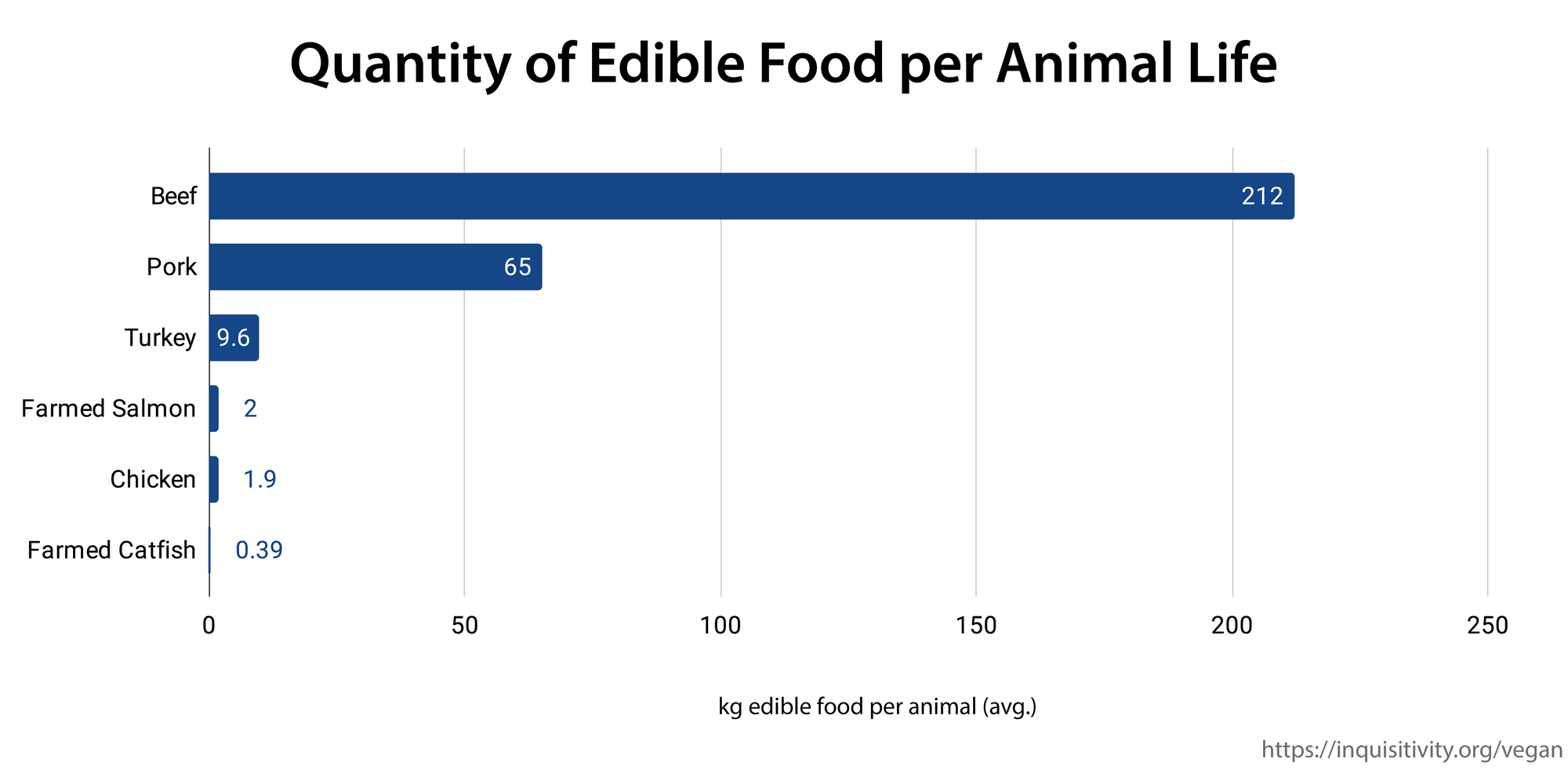
It's difficult to compare or understand how different animals experience life and, eventually, death. But choosing beef over chicken or pork would save a lot of animal lives. Would you rather kill 1 cow or 112 chickens? What about 1 cow versus 3 pigs?
1.1.3 - How much did those animals suffer?
Because so much of the widely circulated information about animal welfare comes from organizations with a clear anti-factory-farm agenda, it's easy to be skeptical. While some of the most outrageous videos may truly be exceptional, there is reasonable consensus about the conditions on most factory-farms. Descriptions of extreme animal crowding and rapid weight gain are consistent with farmers' economic incentives and corroborated by more varied sources. Still, the conditions vary considerably for different animals.
Because cows can digest grass that other animals cannot, those raised for beef get to spend at least part of their life grazing in a field, with a reasonable amount of space. Before slaughter, they're crowded into worse conditions and much smaller spaces where they're fed to gain weight quickly. While not idyllic, beef cows probably have the best living conditions among factory-farmed animals.
Pigs are confined to very small, indoor spaces, where they display signs of distress and boredom that would be unusual in the wild. Females are repeatedly impregnated and separated from their piglets very shortly after birth. Because pigs are considered to be quite intelligent, it seems likely that they suffer in these environments.
Although chickens raised for meat in the United States typically live in broilers (large sheds, not cages), they have very little space to move around and won't go outside in their lives. "Free Range" chickens will have access to sunlight and some outdoor space, though it may be limited or not very accessible. Chickens are bred for rapid weight gain that makes it very difficult to walk, they're often de-beaked without anesthetic, and they sometimes develop rashes or infections on their legs from the broiler's ground conditions. Even if you think that chickens are less sentient or intelligent than mammals, they do exhibit signs of distress. Of these three, chickens probably have the worst conditions.
While I can't be certain about exactly how animals experience their lives, it seems likely enough to be unpleasant that I wouldn't want to be the one raising them like this. If I only eat meat because the animals are sufficiently hidden from me, then I can't honestly say that it's consistent with my values.
I also suspect that if we were able to produce meat at scale without the suffering that's currently required — if it wasn't the status quo — we would not be nearly so tolerant of these practices.
1.1.4 - What about dairy and eggs?
Even though slaughter isn't actually required to get eggs on your plate, hens are typically killed once they're no longer able to lay eggs. Selective breeding and advanced age gives this meat a different taste, so it's often landfilled because the market is so small. And because there is no market for male chicks, they are killed shortly after birth. If an average hen lays about 530 eggs in her life, and male and female chicks are born at equal rates, then each chicken life gives us about 265 eggs (~13.25 kg of food).
Eggs at the supermarket will usually have some indication of the chickens' living conditions (if they don't, the conditions probably weren't good). Caged chickens get <0.5 square feet of space. Cage-free chickens live indoors with slightly more space, but still unpleasant conditions. Free-range chickens have access to the outdoors, but it may be very limited. Pasture-raised chickens have significantly more space — 108 square feet, if also certified humane — but the term isn't regulated by USDA (helpful overviews here and here).
Dairy is slightly better because cows produce a lot (~30,000 kg) of milk in their lives, though these cows are eventually slaughtered for human consumption. Because they live in smaller spaces and are continually impregnated, dairy cows likely suffer more than beef-only cows, but that's spread over the huge quantity of food they produce.
1.2 - Climate Change
Food production accounts for 26% of greenhouse gas emissions globally, but just 9% in the United States because our industrial and transportation emissions are disproportionately high.
Air travel accounts for a big portion of my personal emissions, but because there isn't really a viable alternative, eliminating it would be very socially and emotionally costly for me. My diet may be responsible for a smaller portion of my emissions, but because there are low-cost alternatives, it may be a better way to address my carbon footprint (I go into way more detail on this point here).
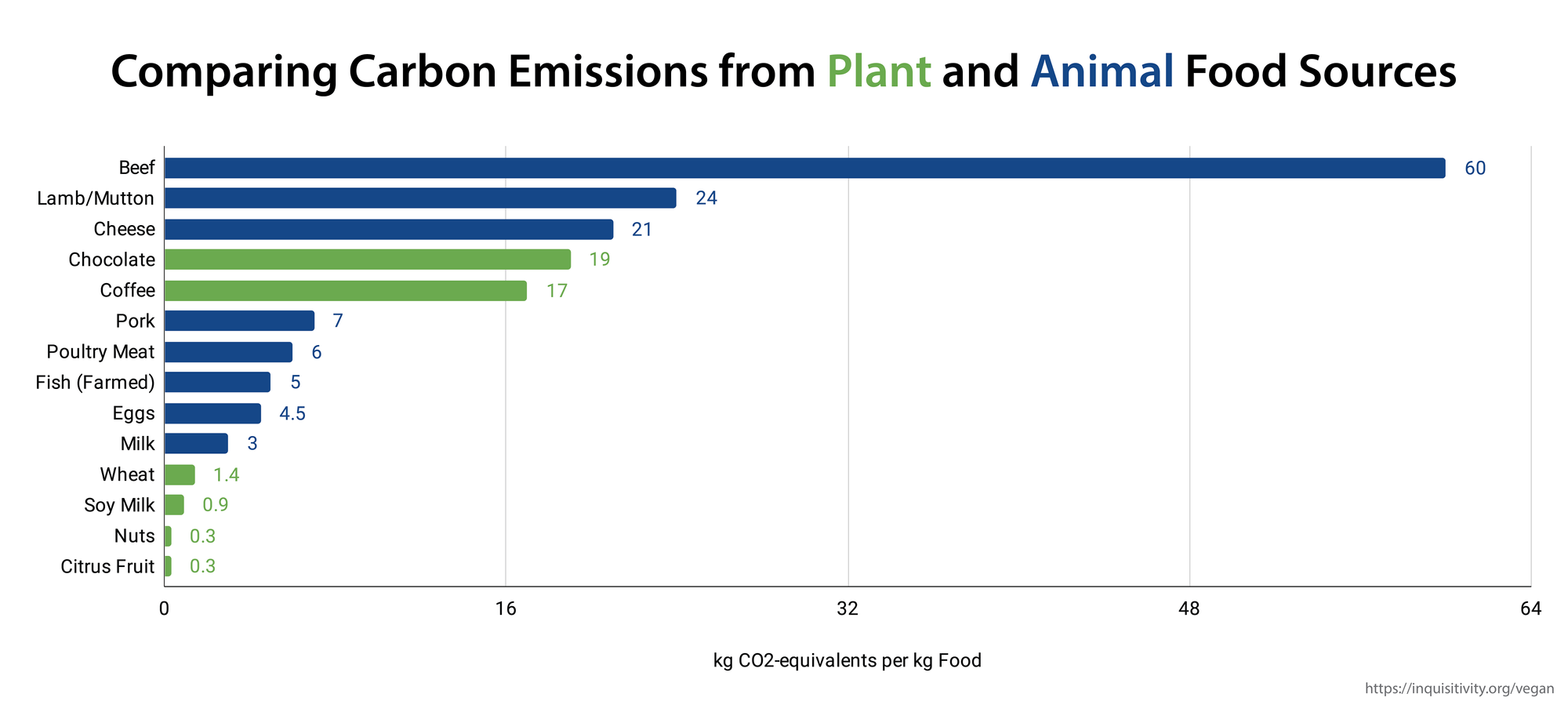
There is a huge amount of variation, which fortunately means that avoiding just a few foods could have a big impact on your diet's emissions. Because growing plants is more efficient than growing animals, animal products almost always yield higher emissions [1].
Beef (and, to a lesser extent, dairy) is especially environmentally costly because cows' digestion process emits a lot of methane, an especially potent greenhouse gas. While this process (enteric fermentation) can be costly, it enables cows to digest foods that humans and other animals cannot. One extremely promising development is a seaweed supplement that could drastically reduce cows' methane emissions without inhibiting their digestion. While this is not yet widely or commercially used, it could make beef much more environmentally viable.
Another big portion of beef's emissions comes from changes in land use— often deforestation for cattle grazing. But cows in the United States are typically raised on land couldn't naturally support crops or a forest. Because cows' methane-emitting digestive systems allow them to digest the grass that grows on otherwise agriculturally unusable land, an optimally land-efficient agriculture system would include some beef and dairy. But because we're so far from a global vegan diet, the land inefficiencies that it might present are not a pressing concern.
Ultimately, the global appetite for meat is increasing quickly, but land that's optimally used by cattle is not, which is driving rapid deforestation in countries like Brazil. While the source of your beef could have a big impact on its direct environmental footprint, contributing to overall beef demand may still indirectly contribute to these harmful land use changes. And until we see widespread solutions for cows' methane emissions, beef will be an environmentally costly option.
Elasticity
When avoiding animal products for ethical reasons, the goal is to reduce overall production, not necessarily your personal consumption.
If, hypothetically, your roommate was about to throw away a perfectly edible steak, the ethical arguments against you eating that steak would be irrelevant. You wouldn't be contributing to the production of an additional steak— because there's no difference to the market whether you eat it or your roommate throws it away— so you wouldn't be responsible for the suffering or emissions that it incentivized.
In that spirit, it's important to consider the effect of elasticity on our ability to reduce production of various items. If I decrease the demand for beef by buying less, then (on average) the price will decrease slightly, and someone else will buy more. The degree of this effect will vary by product, and while your impact will still be directionally consistent— consuming less meat will cause less meat to be produced— the magnitude of that impact may be lower than expected.
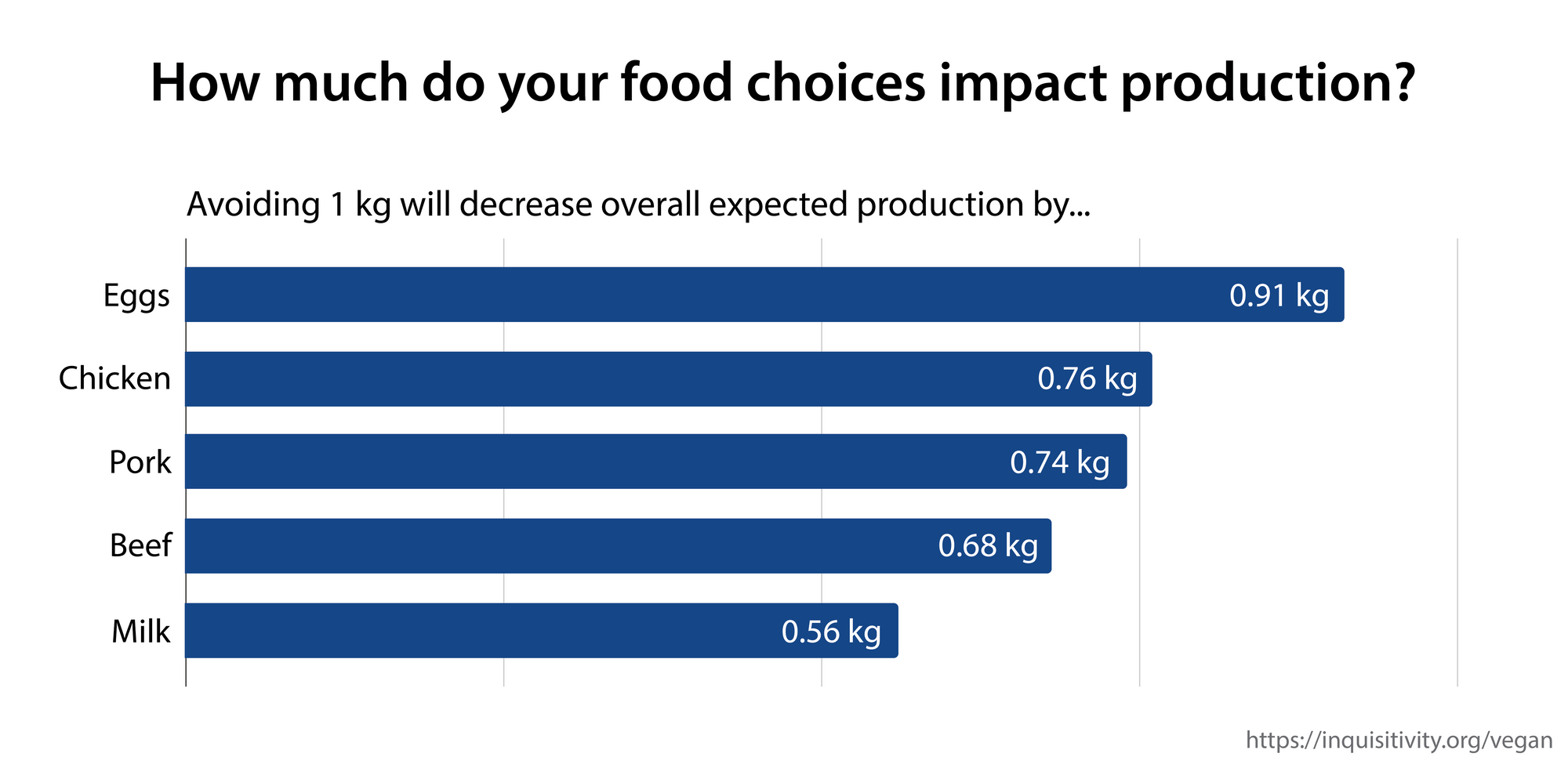
Ethics Conclusion
To minimize animal suffering, avoiding poultry meat, eggs, and pork will have the greatest impact. To minimize your impact on climate change, avoid beef and meat from other ruminants like bison and sheep (but just as importantly, waste less food).
If ethics are a primary concern, eating animals that are very unlikely to be sentient (such as clams, oysters, and mussels) could be a good compromise. And while dairy products may not be ideal, they do come with less expected suffering per serving and lower carbon emissions than other conventional American animal products.
To maintain a reasonable scope and actually finish this article, I didn't do much analysis for the ethics of eating farmed vs. wild fish, so that could be a good follow-up question.
2- Health
2.1 - Disease Prevention
Plant-based diets have been linked with lower rates of some of the most harmful and prevalent diseases in the United States today. But without a long-term, randomized control trial study looking at these diets, it's impossible to prove a causal link between the observed disease prevention and the diets themselves.
Researchers can (and do) try to account for the typical confounding variables (income, race, sex, family history of disease, etc.), but we can't assume that they'll be comprehensive. For example, because vegan and vegetarian diets are generally considered to be healthy, they may be more likely to be adopted by health-conscious people, who are also more likely to adopt other, harder to measure healthy behaviors (exercising, not smoking, avoiding pesticides, etc).
One especially promising study looked at 96,000 members of the Seventh-day Adventist Church. This may be closer to a random control trial because participants adopted vegan or vegetarian diets for religious, not health, reasons, which makes their diets less likely to be correlated with other healthy behaviors. The results showed that vegans had significantly lower rates of diabetes, hypertension, and cancer. The results were consistent (though not always statistically significant) for vegetarians, pesco-vegetarians, and even semi-vegetarians.
Another study— a large meta-analysis that examined 96 observational studies— showed that vegetarians have significantly lower risks of ischemic heart disease and cancer incidence. And Dr. Greger, a physician and prominent advocate for a plant-based eating, has written extensively about more specific nutritional studies, which consistently come out in favor of a whole-foods, plant-based diet.
Overall, there's a very large volume of research showing a strong correlation (but unfortunately not causation) between reduced meat consumption and disease prevention.
2.2 - Pandemic Prevention
While we still don't know the source of the COVID-19 pandemic, one plausible explanation is that it came from a meat market. Even if that wasn't the cause of this pandemic, animal agriculture (especially in dense, factory-farm conditions) has been strongly linked to an increased risk for zoonotic disease. And as the global appetite for meat increases, growing demand for new land will push human activity closer to wildlife, push livestock closer together, and likely further increase these risks of disease.
2.3 - Nutrition
Even the most ardent advocates of a vegan diet will stress the need for at least some vitamin supplementation [2]:
- Most importantly: Vitamin B-12 is primarily found in animal products, so vegans and vegetarians are at an especially high risk of deficiency. Some plant-based foods are fortified, and animal-free, algae-based supplements are available. Some kind of supplementation is basically universally recommended for vegans.
- Omega-3 fatty acids are critical for brain health and typically come in three forms: ALA, EPA, and DHA. Of these, plant foods only contain ALA. Your body can convert some ALA to DHA and APA, but probably not enough. Even with a focus on ALA-rich foods — like chia seeds, flax seeds, and walnuts — vegans may benefit from an algal DHA Omega-3 supplement.
- Because plant-based, non-heme iron is less bioavailable than heme iron, found in meat, vegans and vegetarians are sometimes recommended to supplement or consume more iron overall, but research and recommendations are varied. Vegans and vegetarians should probably at least eat iron-rich foods with known absorption enhancers, like Vitamin-C.
Overall, because plant-based diets tend to be bulkier, higher in fiber, and occasionally less bioavailable, they could come with a general risk of under-fueling. Some research has shown that very high bulk, high fiber diets could damage bone development and increase the risk of nutritional deficiencies in young children. For adults, these risks can be mitigated with careful planning and supplementation, but they should be taken seriously. For young children, the nutritional risks might outweigh any health benefits.
2.4 - Weight Loss
Research has consistently found that vegan and vegetarian diets are linked to lower BMIs. This trend was present in the (aforementioned) Seventh-Day Adventist study and meta-analysis of 96 observational studies. Unlike for long-term disease prevention, there are some randomized control trials in this area. One such study showed significant weight loss and maintenance in participants who were educated about the benefits of a whole-foods, plant-based diet (compared to just receiving standard medical treatment). A possible mechanism for this is that whole plant foods are typically less calorically dense and higher in fiber, which could decrease overall consumption and calorie absorption (Dr. Michael Greger describes these findings and mechanisms here).
2.5 - Athletic Performance
For athletes, who often have higher nutritional needs, the risks and costs of nutritional deficiency could be higher than for the general population. Likewise, the factors in a plant-based diet that contribute to weight loss could increase the risk of under-fueling, especially for endurance athletes.
While popular documentaries have touted the athletic benefits of a vegan diet, the risks of nutritional deficiency should be seriously considered. Anecdotally, it's still reasonably rare to see elite athletes who adhere to a strict vegan diet [3].
2.6 - Mental Health
Safely eliminating food groups could be difficult for some people with a history of disordered eating. For them, the risks could far outweigh any other expected benefits and should be incorporated appropriately.
Health Conclusion
Research seems to strongly suggest that a vegan or vegetarian diet is beneficial for disease prevention and overall lifespan. But without randomized control trials, we can't completely discount the possibility that this is actually because of other, correlated, healthy behaviors.
Even if we assume that a plant-based diet does help prevent disease, nutritional deficiency is a legitimate concern, especially for children. Even the strongest proponents of a vegan diet emphasize the importance of vegans taking at least a B-12 supplement, but the limited bioavailability and risk of contaminants could make this an imperfect solution.
Processed meats, refined grains, and refined sugars — staples of the Standard American Diet — are not seriously considered by anyone to be healthy, but there is some remaining debate about whether or not to add a small amount of high-quality animal products to an otherwise minimally processed plant-based diet. To simplify, this disagreement seems to come down to the relative risks of nutritional deficiency versus certain diseases (heart disease, hypertension, diabetes).
Your decision will likely hinge on how you prioritize these risks and how confident you are in the available research. Young athletes, for example, may face more risk from nutritional deficiencies and therefore decide to continue eating some animal products. People with a family history of heart disease may want to prioritize the disease prevention benefits of a vegan or vegetarian diet. For many, moderation could help balance the lingering uncertainty and potential risks of each diet.
3 - Social
Making decisions that differ from your peers' comes with very real social costs, and avoiding animal products is no exception. Vegans and vegetarians — especially those primarily motivated by ethical considerations — are generally pretty unpopular. Continually explaining your dietary choices or asking for accommodations at restaurants and dinner parties can be difficult. And even if your friends are understanding, it's hard to avoid the foods that people around you are enjoying.
Some dishes, which may contain animal products, could provide you with an important sense of identity, culture, or community, and be very costly to give up. Personally, there are several dishes that my dad makes which I'd be sad to never eat again. And, If your religious beliefs or those of your community push you towards a certain diet, deviating from that could be very difficult.
Food is nutritionally important, but it also plays a role in meeting our social, emotional, and cultural needs. These costs could just be additional factors to weigh against all the others, but I think they also demonstrate how an all-or-nothing approach can be unproductive.
You can make exceptions for specific dishes that you couldn't imagine living without. If you don't want to miss certain experiences, you can make a different set of rules for important holidays or vacations. Avoiding animal products isn't only for those who feel 100% conviction, and you don't need to limit yourself to a yes-or-no answer. The goal should be for your food choices to match your values and goals.
4 - Convenience
Unavoidably, eliminating animal products from your diet will give you fewer options. If you live in a place where food options — especially for fresh produce and plant-based proteins — are already limited, then finding suitable vegan options may be especially difficult or time consuming. Even if overall access isn't an issue for you, finding appealing vegan options may require more effort. Avoiding foods that you may enjoy will require more self-control, and meeting your nutritional needs may require additional cooking, shopping, or planning.
The feasibility of a vegan or vegetarian diet will vary widely depending on your circumstances. I think these costs are too often ignored in dietary decisions, which makes them harder to maintain and less likely to be correct for you.
5 - Taste
Certainly, there are a lot of delicious vegan and vegetarian dishes, but they're all still available in an unrestricted omnivore diet. The magnitude of the cost to taste will depend on how much you enjoy animal products, compared to how much you enjoy the available replacements.
6 - Financial
While some specialty vegan products can be very expensive, they’re not really necessary. For the most part, meat is more expensive than vegetarian proteins, and research has shown that "true vegetarians" spend less money on food ("flexitarians" seem to spend more). Some of these cost differences are due to food choices, while some are due to confounding demographics. Overall, a vegetarian diet will likely be less expensive, but there's a lot of variation in actual spending.
Personal Conclusion
Fundamentally, this is a prioritization problem. The options are reasonably clear, and with some reasoning and research, we can estimate the impact of those options on various outcomes (i.e. all the analysis above). Using that information to prioritize our potentially competing goals is the central challenge of this decision.
Even a crude attempt to quantify these variables and their lingering uncertainty is helpful. To estimate the net-impact of a vegan diet — versus an unrestricted omnivore diet — I calculated a weighted score for each variable by combining three figures:
- Impact: How much will the diet in question affect this variable? Of course, my personal impact climate change will always be very small, in an absolute sense, so the scale here is relative to the maximum impact I could realistically have.
- Importance: How much do I care about this variable? Because there's no real absolute scale to use here, these numbers are just relative to each other. I care a lot about disease prevention, and not that much about the financial costs.
- Confidence: How likely am I to be right about the magnitude and direction of my estimated impact? [4]
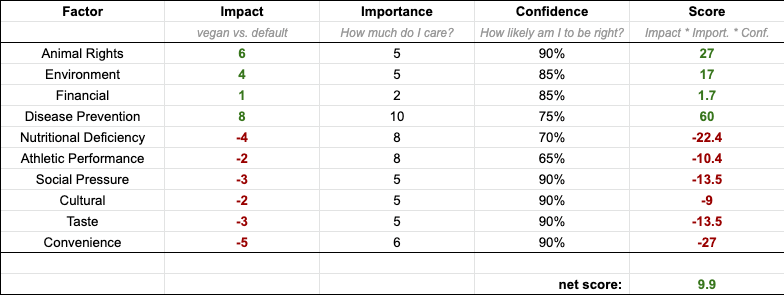
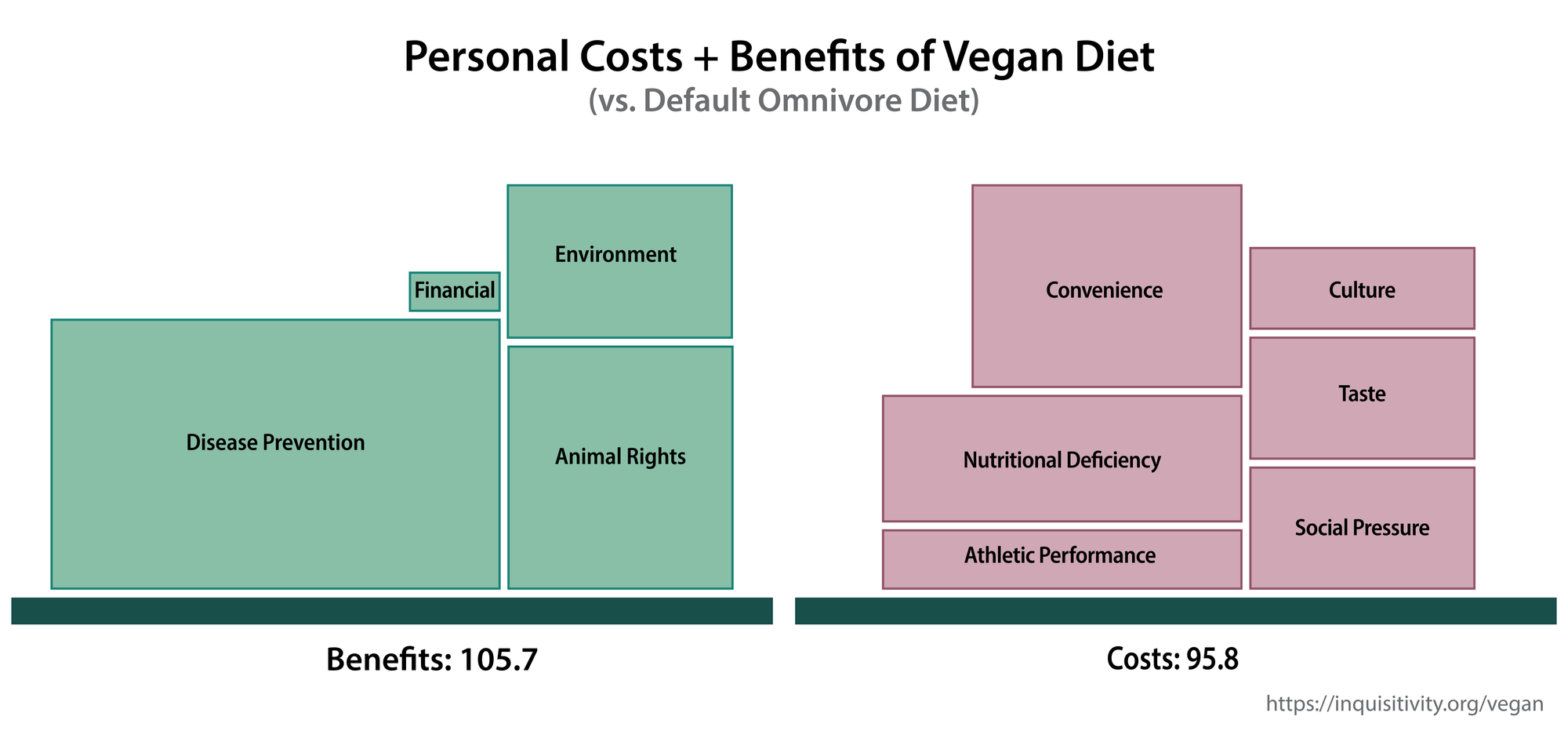
The net-effect of a vegan diet is slightly positive, but the costs aren't trivial.
If I include some dairy and pasture-raised eggs (about 1-2 servings per week of each), then I can still eat baked goods and have reasonable options at most restaurants. For me, this would significantly decrease the social costs, inconvenience, and taste concessions. If I also remove all restrictions for high social-cost situations and nostalgic family meals (probably 1-2 per month), then the overall costs decrease even further.
Because the final 10% of animal products account for roughly 10% of the health, ethical, and financial benefits, but closer to 80% of the social, taste, and convenience costs, just a few directed adjustments can increase the expected net-benefit dramatically.
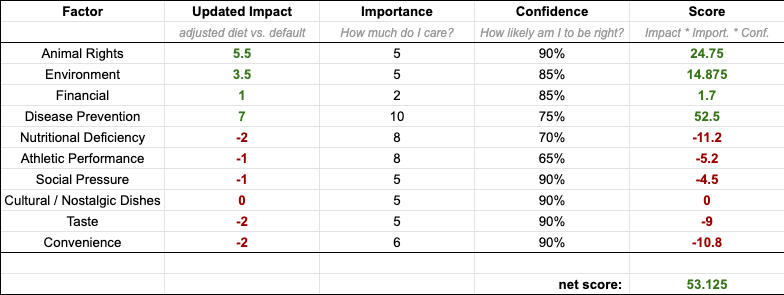
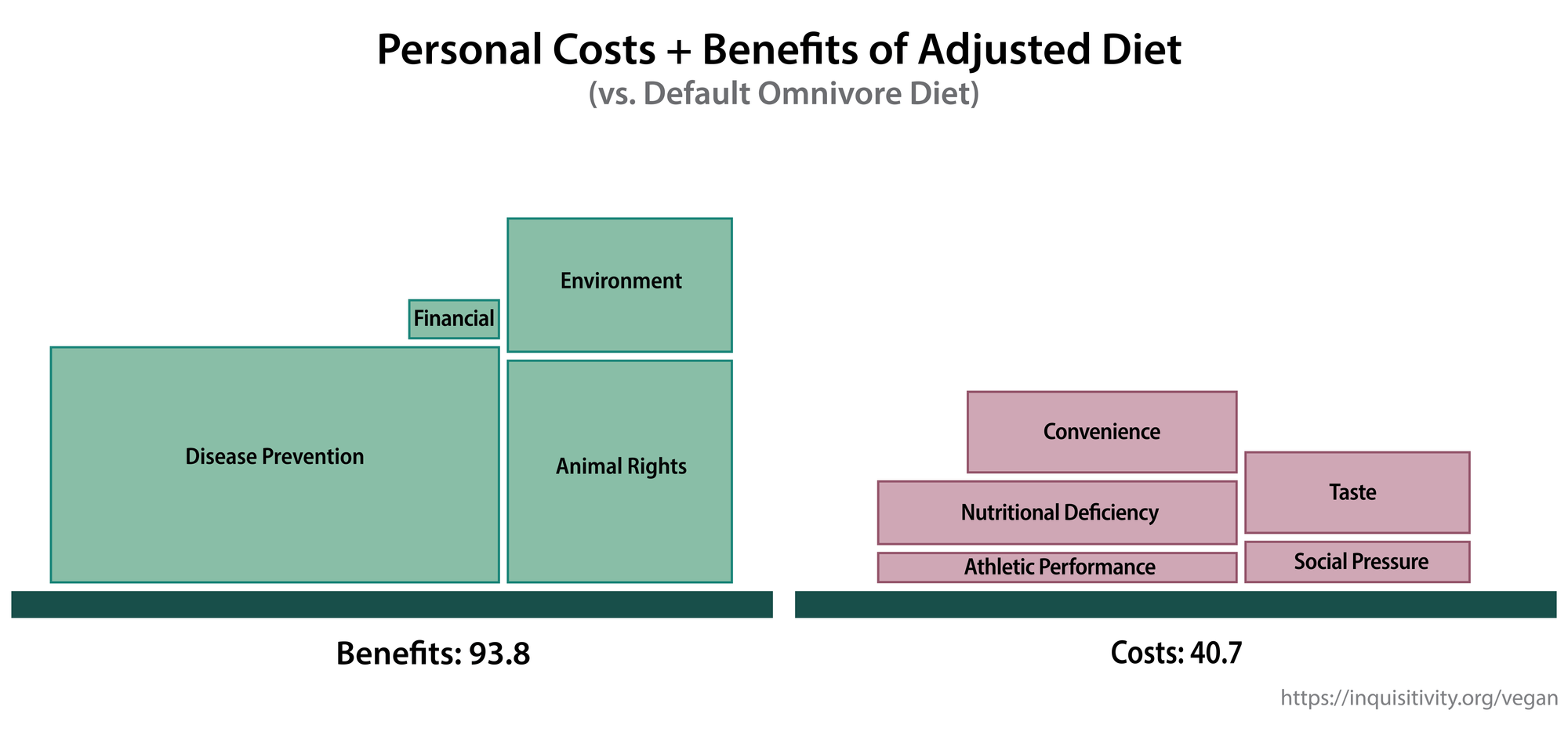
While this exercise may seem a bit rigid or unrealistic, it forces me to acknowledge what I really believe to be the right decision, and that makes me much more likely to maintain my conviction in a moment where I just really want a cheeseburger. Seeing all of the estimated consequences laid out together makes it harder to ignore the inconvenient ones.
Because I tried to be as comprehensive as possible, I'm left with a decision that I trust. I can re-evaluate at any time, but I can also expect myself to justify new conclusions with new evidence or real changes in prioritization.
An unexpected benefit to adding minor adaptations — like sometimes eating dairy — is that my decision is less likely to become part of my identity, which will make it easier to incorporate new evidence as I encounter it, even if it conflicts with my current conclusion.
In practice, to decrease the decision burden, my default expectation will be to avoid eating meat. But in situations where there's no good alternative, I'll just be more flexible in giving myself an exception. To limit other animal products, I'll plan to very occasionally buy humane-certified, pasture-raised eggs, and to just not buy dairy at the grocery store altogether.
General Conclusion
Avoiding this decision is impossible. Every meal you eat either includes animal products or it does not. Coming to a conclusion involves answering and then prioritizing questions of ethics, identity, health, nutrition, and taste, and there's no universally right or wrong answer. Every conclusion comes with tradeoffs, and even though comparing those tradeoffs is personal and complicated, it is possible.
Footnotes
[1] Two exceptions to this rule are chocolate and coffee. Luckily, these products are often consumed in smaller quantities (by weight) than others on this list.
[2] Supplements are unregulated in the United States, so they could come with a higher risk of contaminants or mislabeling than other foods. This is a point that I want to investigate further.
[3] Extremely anecdotally, elite distance runner Woody Kincaid has described how his coach convinced him to reintroduce animal products to his diet after suffering from several stress fractures.
[4] I'm not using the confidence percentage to generate an updated expected impact score, because that would require making assumptions about the distribution of possible impacts. I'm just using it to weight the scores according to my confidence, placing a higher emphasis on the ones I trust more.